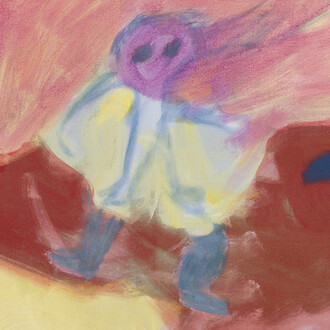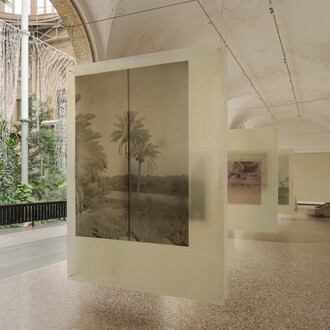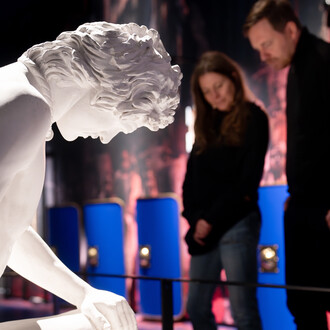Pictures of beautiful women and heroic warriors in battle can be experienced this spring at Designmuseum Danmark. The exhibition In love and war features carefully selected woodblock prints from the museum’s large collection of Japanese craftsmanship and is both a story about the woodblock print – a new popular media in Japan at the time, which spread both entertainment and ideology, and which helped foster the so-called ‘Japanism’, that had a great influence on Danish design.
As the saying goes: all is fair in love and war. The well-known saying – and the great existential themes of love and warfare that both history books, literature and art have dealt with over the centuries – form the title of a new exhibition at Designmuseum Danmark, which shows 64 woodblock prints from the museum’s collection of East Asian art, including woodblock prints – some of which are exhibited here for the first time.
Samurais and beautiful women
In love and war offers a rare glimpse into a period in Japan’s history when the shogun ruled, and the country was isolated from the outside world. In the exhibition, the audience can experience idealized images of women from the so-called Edo period (1600-1868), when the Tokugawa shogunate ruled from the capital Edo, today Tokyo – as well as images of samurai and modern graphic war images from the Meiji period ( 1868-1912), where the feudal rule under the shogun was replaced by a constitutional monarchy under Emperor Meiji, and where the country opened up to the outside world.
An idealization of everyday life
The famous Japanese ukiyo-e woodcut was one of the foremost art forms of the Edo period. The special expression in these woodblock prints idealized everyday life for the prostitutes of the time or functioned as visual propaganda in the form of war images with nationalist and patriotic undertones. For audiences in the Edo and Meiji periods, these popular prints, which were reproduced in great numbers, were not considered fine art, but rather seen as entertainment or current affairs. When Japan opened its borders to the outside world in the mid-1800s, many of the prints were exported to the West and bought by artists and institutions, including Designmuseum Danmark.
Danish design inspired by Japan
In 2015, Designmuseum Danmark showed the popular exhibition Learning from Japan, which showed objects from the museum’s Japanese collection, including woodblock prints, alongside Danish craftsmanship, design, architecture and graphics with inspiration from Japan. With In love and war, it is the first time in recent times that the museum has dedicated an entire exhibition to the Japanese woodblock print – a unique opportunity to learn more about a traditional, craft-based art medium that, among other things, has relations with the Japanese graphic novel ‘manga’, and which in addition, has had a great influence on the art and design of the Western world.
The exhibition is curated by art historian and associate professor Asato Ikeda, Fordham University, New York City, and art historian and associate professor Gunhild Ravn Borggreen from the Department of Art and Cultural Studies at the University of Copenhagen.
















